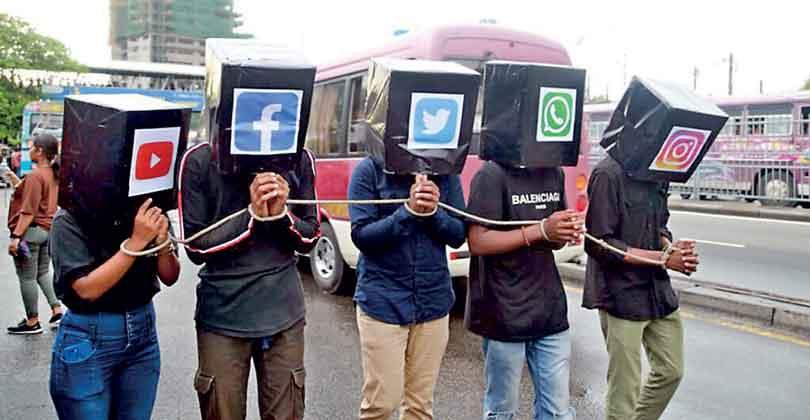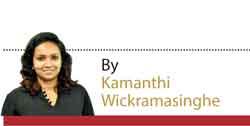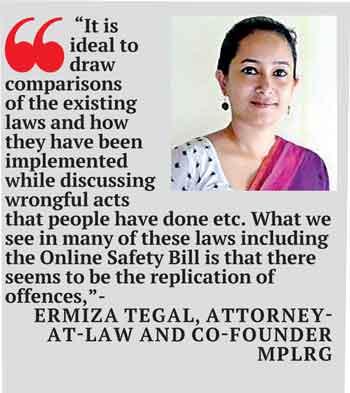18 Oct 2023 - {{hitsCtrl.values.hits}}

Legal experts point out that there is also going to be a code of conduct drafted by the Online Safety Commission and in the event that this code has been violated, an individual or institution will be liable to pay compensation Photo courtesy - Ajith Seneviratne - Lanka News Web
As many as 29 petitions have already been filed challenging the proposed Online
Safety BillSome of the concerns raised regarding the Bill include vague definitions
Law experts point out that the proposed bill is a violation of very basic rules of natural justice that our Constitution and the legal system rely on
Law experts opine that the Bill stands to change Sri Lanka’s online culture where people have the freedom to operate anonymously, to engage in satire, parody to pass on things in comedy
If one compares the penalties its three times more, hence the proposed bill warrants scrutiny as there is a lack of rationality in how these penalties are being imposed
 The Online Safety Bill gazetted on September 18 and tabled in Parliament by Public Security Minister Tiran Alles has come under much scrutiny by media groups, rights activists and civil society organizations. Some of the concerns raised regarding the Bill include vague definitions and the fact that a gamut of offences, which already exist in the Penal Code, have been included in this new Bill with higher penalties. Many policy analysts observe that this Bill has been drafted to further suppress freedom of expression even though government factions reiterate the fact that the Bill would put an end to defamation, misinformation and disinformation, mainly targeted at the government. In this backdrop, as many as 29 petitions have already been filed challenging the Online Safety Bill and will be taken up for hearings in the Supreme Court today (October 18).
The Online Safety Bill gazetted on September 18 and tabled in Parliament by Public Security Minister Tiran Alles has come under much scrutiny by media groups, rights activists and civil society organizations. Some of the concerns raised regarding the Bill include vague definitions and the fact that a gamut of offences, which already exist in the Penal Code, have been included in this new Bill with higher penalties. Many policy analysts observe that this Bill has been drafted to further suppress freedom of expression even though government factions reiterate the fact that the Bill would put an end to defamation, misinformation and disinformation, mainly targeted at the government. In this backdrop, as many as 29 petitions have already been filed challenging the Online Safety Bill and will be taken up for hearings in the Supreme Court today (October 18).
Main features of the Bill
One of the restrictions observed is the fact that existing laws with fairly clear text such as provisions modelled on international benchmarks such as in Section 3 of the ICCPR Act have been misinterpreted and misapplied in various contexts. “Even with a well-drafted Bill there is always a challenge of enforcing the Bill, similar to what has been happening with the ICCPR Act,” said Dr. Gehan Gunatilleke, a lawyer specializing in human rights and constitutional law at a discussion regarding the Online Safety Bill, organised by Hashtag Generation. “This Bill brings into operation a completely new institution which is the Online Safety Commission. One of the concerns that have been raised with respect to this Commission is that it will be appointed by the President and the President alone. In terms of hiring and firing members of this Commission their political independence is not necessarily guaranteed. There may be good appointees as well as appointees who are politically inclined. This is where we have a system where the Constitutional Council appoints members to independent commissions. This leaves room for the possible politicisation of a Commission of this nature,” he said.
 Dr. Gunatilleke pointed out that despite possible politicisation it exercises far-reaching powers including powers to issue notices, power to issue directives according to criteria that don’t seem to be included in the Bill. “Likewise there are certain powers that sometimes quasi-judicial in nature. Leaving aside the fact that this Commission can be politicised and that they can exercise such wide-ranging powers, one thing about the Bill is that these notices and directives and decisions are made without affording the affected party with an opportunity to be heard. This is a serious concern raised with respect to the Bill. The people will not have an opportunity to be heard and to plead their case before decisions that adversely affect them will be made. For example if there’s a statement that is deemed false or prohibited as stated under the Bill under a particular online location or an online account, the Commission can direct that individual or user to take down the post immediately. The Commission will make that decision based on evidence available without necessarily having to hear that party before making that decision. That’s a violation of very basic rules of natural justice that our Constitution and the legal system rely on. That’s one of the main concerns raised with respect to the Commission,” he explained.
Dr. Gunatilleke pointed out that despite possible politicisation it exercises far-reaching powers including powers to issue notices, power to issue directives according to criteria that don’t seem to be included in the Bill. “Likewise there are certain powers that sometimes quasi-judicial in nature. Leaving aside the fact that this Commission can be politicised and that they can exercise such wide-ranging powers, one thing about the Bill is that these notices and directives and decisions are made without affording the affected party with an opportunity to be heard. This is a serious concern raised with respect to the Bill. The people will not have an opportunity to be heard and to plead their case before decisions that adversely affect them will be made. For example if there’s a statement that is deemed false or prohibited as stated under the Bill under a particular online location or an online account, the Commission can direct that individual or user to take down the post immediately. The Commission will make that decision based on evidence available without necessarily having to hear that party before making that decision. That’s a violation of very basic rules of natural justice that our Constitution and the legal system rely on. That’s one of the main concerns raised with respect to the Commission,” he explained.
“Then there are new offences which are broadly phrased such as a ‘false statement that could be a threat to national security has been made an offence under Clause 12 of the Bill. How a false statement could threaten national security is left open to interpretation and in that context we will encounter situations where these particular offences can be misapplied to cover a broad range of events and activities,” Dr. Gunatilleke added.
Replication of offences
There are also a series of clauses in the Bill that replicate similar clauses/offences which are already found in the Penal Code and the problem there is that the penalties that are being imposed in terms of equivalent offences are much higher under the proposed Bill. “For example the disrupting of a public religious assembly which is already an offence under the Penal Code, under the Online Safety Bill, issuing or communicating a false statement that could cause a disruption to a public religious assembly is also an offence with a much higher penalty. If you compare the penalties its three times more. This warrants scrutiny as there is a lack of rationality in how these penalties are being imposed. If some person goes to a religious assembly and physically disrupts it he can be held under the Penal Code and face up to one year imprisonment. But causing that same disruption through a false statement will be an offence under the Online Safety Bill but carrying a three year sentence. Therefore there is a lack of proportionality in terms of how the penalties are being imposed,” he opined.
Criminalising satire, parody and comedy?
One other substantive issue is on the question of impersonation. Clause 19 of the Bill replicates the Penal Code offence Section 399 which makes cheating by impersonation an offence. Clause 19 follows the same model where it replicates the elements of that offence with the addition of the idea that it’s happening on an online space. “Cheating by impersonation under an ordinary criminal law has a particular meaning where you default someone or deceive someone, causing them some financial loss or some serious harm by pretending to be someone else. But when it comes to the online safety bill when cheating by impersonation is being explained, the elements of the offence is explained in that particular clause with a curious omission where the element of cheating has been dropped from the elements of the offence. When you compare the draft offence with the existing offence, the element of cheating is missing. Hence, the repercussions are serious because this means that any type of impersonation which would include the kinds of impersonation that you have in satire, comedy, parody and all these kinds of impersonations that we have online suddenly become criminalised.
You don’t need to have impersonation with the intent of cheating to be found guilty of that particular offence. I think the Bill stands to change our online culture where people have the freedom to operate anonymously, to engage in satire, parody to pass on things in comedy and all these will be deeply affected if this offence is permitted to come into our statute books,” said Dr. Gunatilleke.
This would also be a potential threat to marginalised segments such as transgender persons who have for instance a Facebook account with a pet name. He/She may be going through a transition period from a biological point of view and suddenly, if someone perceives this social media handle as that of an impersonator, then the user maybe criminalized under this Bill.
Curtailing freedom of expression
Legal experts also stress on the fact that any incoming laws should address how previous laws have been misapplied and selectively applied for particular individuals who have on most occasions either critiqued individuals or the government for the day in various instances. “Lawmaking in Sri Lanka should be something that we talk about because there have been pieces of proposed legislation that the public have to consume within a short period of time and respond to,” said Ermiza Tegal, attorney-at-law and co-founder of Muslim Personal Law Reform Action Group (MPLRG). “It is ideal to draw comparisons of the existing laws and how they have been implemented while discussing wrongful acts that people have done etc. What we see in many of these laws including the Online Safety Bill is that there seems to be the replication of offences. When there’s a replication of offences you can use the Penal Code, but this law also has an offence with a higher penalty, then law enforcement authorities get to decide on which law they will use and who will be prosecuted under the higher penalty
. It looks like that the entire scheme of the Online Safety Bill is about restricting freedom of expression. Freedom of expression is the guarantee under Section 14 of the Constitution while Section 15 includes instances when freedom of expression can be curtailed or restricted by law,” said Tegal.
Potential targets
She further stressed that the Bill includes a host of offences that have been created. “Clause 12-20 and beyond includes a series of offences that refer to words that have not been broadly discussed under the act. There is also going to be a code of conduct drafted by the Online Safety Commission and in the event that this code has been violated, an individual or institution will be liable to pay compensation. But we don’t know what would be included in this code of conduct. Therefore the potentiality of very many acts to attract criminality to be easily mobilised against individuals is of serious concern where it seems that policymakers themselves have restricted the freedom of expression. I would say that fairly ordinary conduct, legitimate conduct, descent and critique against government activity has great potential to become targeted under this law. It also creates this chilling effect because those who used the internet and those who create content for online sites are already in a situation where they will be worried about whether they are engaged in activities that would attract these offences,”
explained Tegal.
Lawmakers express mixed reactions
Content creators have also raised concerns on whether the contents of this Bill would discourage leading social media platforms to withdraw their agreements from Sri Lanka. This point was reiterated when Samagi Jana Balawegaya MP Dr. Harsha De Silva raised this matter in Parliament. Media groups, civil society activists too have been raising concerns with regards to this Bill urging the government to shed its draconian avatar. Malcolm Cardinal Ranjith is one among the petitioners who highlighted on arbitrary and wide-ranging powers that the President could exercise when appointing members to the Online Safety Commission.
However United National Party Chairman Vajira Abeywardena said that the Bill would allow for Sri Lanka to implement regulatory frameworks similar to the Singaporean model with regards to data protection and that the Bill is mainly being pushed to prevent defamatory statements, propagation of falsehoods and destroying people’s characters. In response to mounting protests against this Bill, Public Security Minister Tiran Alles has agreed to hold consultations with key stakeholders before voting in the legislature. In a statement issued earlier this month the Minister said that he would discuss the Bill with the Asian Internet Coalition, Sri Lanka Bar Association, diplomatic office as well as civil and media organizations. However, attempts made to contact the Minister to inquire on the progress made with regards to these consultations proved futile.
03 May 2024 2 hours ago
03 May 2024 2 hours ago
03 May 2024 3 hours ago
03 May 2024 3 hours ago
03 May 2024 4 hours ago